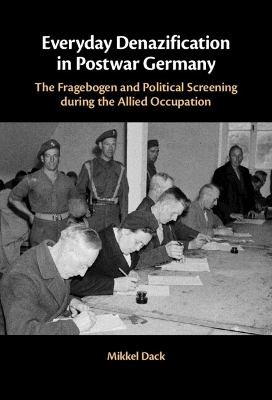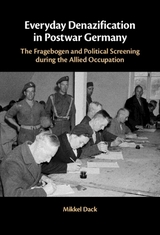Everyday Denazification in Postwar Germany
The Fragebogen and Political Screening during the Allied Occupation
Seiten
2023
Cambridge University Press (Verlag)
978-1-009-21633-3 (ISBN)
Cambridge University Press (Verlag)
978-1-009-21633-3 (ISBN)
In the wake of the Second World War, the victorious Allied armies distributed twenty million political questionnaires, or Fragebögen, to anxious Germans who hoped to prove their non-Nazi status and gain employment. This grassroots history illuminates the Allied screening campaign and offers an original and comprehensive history of denazification.
In the wake of World War II, the victorious Allied armies implemented a radical program to purge Nazism from Germany and preserve peace in Europe. Between 1945 and 1949, 20 million political questionnaires, or Fragebögen, were distributed by American, British, French, and Soviet armies to anxious Germans who had to prove their non-Nazi status to gain employment. Drafted by university professors and social scientists, these surveys defined much of the denazification experience and were immensely consequential to the material and emotional recovery of Germans. In Everyday Denazification in Postwar Germany, Mikkel Dack draws the curtain to reveal what denazification looked like on the ground and in practice and how the highly criticized vetting program impacted the lives of individual Germans and their families as they recovered from the war. Accessing recently declassified documents, this book challenges traditional interpretations by illustrating the positive elements of the denazification campaign and recounting a more comprehensive history, one of mid-level Allied planners, civil affairs soldiers, and regular German citizens. The Fragebogen functions as a window into this everyday history.
In the wake of World War II, the victorious Allied armies implemented a radical program to purge Nazism from Germany and preserve peace in Europe. Between 1945 and 1949, 20 million political questionnaires, or Fragebögen, were distributed by American, British, French, and Soviet armies to anxious Germans who had to prove their non-Nazi status to gain employment. Drafted by university professors and social scientists, these surveys defined much of the denazification experience and were immensely consequential to the material and emotional recovery of Germans. In Everyday Denazification in Postwar Germany, Mikkel Dack draws the curtain to reveal what denazification looked like on the ground and in practice and how the highly criticized vetting program impacted the lives of individual Germans and their families as they recovered from the war. Accessing recently declassified documents, this book challenges traditional interpretations by illustrating the positive elements of the denazification campaign and recounting a more comprehensive history, one of mid-level Allied planners, civil affairs soldiers, and regular German citizens. The Fragebogen functions as a window into this everyday history.
Mikkel Dack is Assistant Professor of History at Rowan University and Director of Research at the Rowan Center for the Study of the Holocaust, Genocide, and Human Rights.
List of Illustrations; Acknowledgments; List of Abbreviations; Introduction; 1. An Army of Academics: Planning the Denazification of Germany; 2. 'A Miserable Paper Substitute for a Spontaneous Revolution': Drafting the Questionnaire; 3. 'Land of the Fragebogen': Screening the German Population; 4. The 'Little Man's Nuremberg': Germans and Denazification; 5: Writing Away Culpability: The Unintended Outcomes of Denazification; Conclusion; Appendices: The Fragebogen Questions; Bibliography; Index.
| Erscheinungsdatum | 29.11.2021 |
|---|---|
| Zusatzinfo | Worked examples or Exercises |
| Verlagsort | Cambridge |
| Sprache | englisch |
| Maße | 154 x 235 mm |
| Gewicht | 650 g |
| Themenwelt | Geschichte ► Allgemeine Geschichte ► 1918 bis 1945 |
| Geschichte ► Teilgebiete der Geschichte ► Militärgeschichte | |
| Sozialwissenschaften ► Politik / Verwaltung ► Politische Systeme | |
| Sozialwissenschaften ► Politik / Verwaltung ► Politische Theorie | |
| ISBN-10 | 1-009-21633-3 / 1009216333 |
| ISBN-13 | 978-1-009-21633-3 / 9781009216333 |
| Zustand | Neuware |
| Informationen gemäß Produktsicherheitsverordnung (GPSR) | |
| Haben Sie eine Frage zum Produkt? |
Mehr entdecken
aus dem Bereich
aus dem Bereich
ein Psychologe erlebt das Konzentrationslager
Buch | Hardcover (2024)
Kösel (Verlag)
22,00 €
Mythos „Stauffenberg-Attentat“ – wie der 20. Juli 1944 verklärt und …
Buch | Hardcover (2024)
Goldmann (Verlag)
24,00 €




